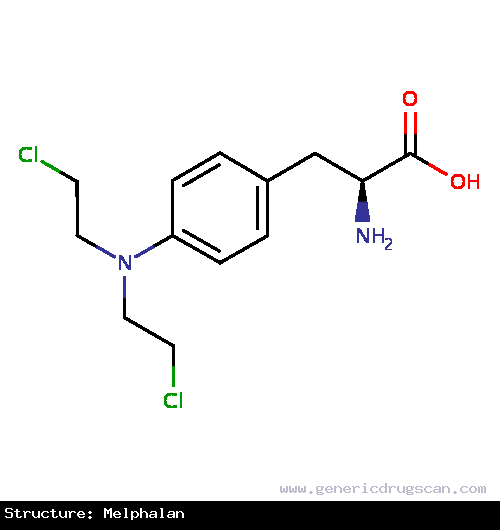Melphalan Drug: Indication, Dosage, Precaution, Side Effect , Storage, Category Type and corresponding Brands - www.genericdrugscan.com
Melphalan
Drug Status in USA : ApprovedDrug Status in Canada : Approved
pronunciation
pronounced as (mel' fa lan)
Why is this medication prescribed?
Melphalan is used to treat multiple myeloma (a type of cancer of the bone marrow). Melphalan is also used to treat a certain type of ovarian cancer (cancer that begins in the female reproductive organs where eggs are formed). Melphalan is in a class of medications called alkylating agents. It works by stopping or slowing the growth of cancer cells in your body.
How should this medicine be used?
Melphalan comes as a tablet to take by mouth. It is usually taken on an empty stomach once a day. The length of treatment depends on the types of drugs you are taking, how well your body responds to them, and the type of cancer you have. Take melphalan at around the same time every day. Follow the directions on your prescription label carefully, and ask your doctor or pharmacist to explain any part you do not understand. Take melphalan exactly as directed. Do not take more or less of it or take it more often than prescribed by your doctor.
Your doctor may need to delay your treatment or adjust your dose of melphalan depending on your response to treatment and any side effects that you experience. Talk to your doctor about how you are feeling during your treatment. Do not stop taking melphalan without talking to your doctor.
Ask your pharmacist or doctor for a copy of the manufacturer's information for the patient.
What are the precautions to be followed?
Before taking melphalan,- tell your doctor and pharmacist if you are allergic to melphalan, any other medications, or any of the ingredients in melphalan tablets. Ask your pharmacist for a list of the ingredients.
- tell your doctor and pharmacist what other prescription and nonprescription medications, vitamins, nutritional supplements, and herbal products you are taking or plan to take. Be sure to mention any of the following: carmustine (BICNU, BCNU), cimetidine (Tagamet), cisplatin (Platinol AQ), cyclosporine (Sandimmune, Gengraf, Neoral), or interferon alfa (Intron A, Infergen, Alferon N).
- tell your doctor if you have taken melphalan before, but your cancer did not respond to the medication. Your doctor will probably tell you not to take melphalan.
- tell your doctor if you have received radiation therapy or other chemotherapy recently or if you have or have ever had kidney disease.
- you should know that melphalan may interfere with the normal menstrual cycle (period) in women and may temporarily or permanently stop sperm production in men. Melphalan may cause infertility (difficulty becoming pregnant); however, you should not assume that you cannot get pregnant or that you cannot get someone else pregnant. Women who are pregnant or breast-feeding should tell their doctors before they begin taking this drug. You should not plan to have children while receiving chemotherapy or for a while after treatments. (Talk to your doctor for further details.) Use a reliable method of birth control to prevent pregnancy. Melphalan may harm the fetus.
- do not have any vaccinations without talking to your doctor.
What are possible side effects of this medication ?
Melphalan may cause side effects. Tell your doctor if any of these symptoms are severe or do not go away:- nausea
- vomiting
- loss of appetite or weight
- sores in the mouth and throat
- missed menstrual periods (in girls and women)
- joint, muscle, or back pain
- rash
- hives
- itching
- difficulty breathing or swallowing
- pale skin
- excessive tiredness
- fainting
- fast, irregular, or pounding heartbeat
- yellowing of the skin or eyes
- pain in the upper right part of the stomach
- dark colored urine
- unusual lumps or masses
Melphalan may cause other side effects. Call your doctor if you have any unusual problems while taking this medication.
How to store the medication and dispose it of after its use later?
Keep this medication in the container it came in, tightly closed, and out of reach of children. Store it in the refrigerator and away from light. Throw away any medication that is outdated or no longer needed. Talk to your pharmacist about the proper disposal of your medication.
Drug Category/Class
- Nitrogen Mustard Analogues
- Alkylating Agents
- Antineoplastic Agents
- Antineoplastic and Immunomodulating Agents
- Antineoplastic Agents, Alkylating
- Myeloablative Agonists
- Immunosuppressive Agents
- Nitrogen mustard analogues
| Prescribed | For the palliative treatment of multiple myeloma and for the palliation of non-resectable epithelial carcinoma of the ovary. Has also been used alo... |
| Weight : | 305.2 |
| Structure | Melphalan |
 | |
| Formula | C13H18Cl2N2O2 |
Melphalan has 11 Brands listed
| Alkacel (2 mg) | Alkacel (5 mg) |
| Alkacel (50 mg) | Alkeran (2 mg) |
| Alkeran (5 mg) | Alkeran (50 mg) |
| Melfalax (2 mg) | Melfalax (5 mg) |
| Melfalax Lyo | Melphalan (2 mg) |
| Melphaz |
Search Generic Drugs alphabetically
